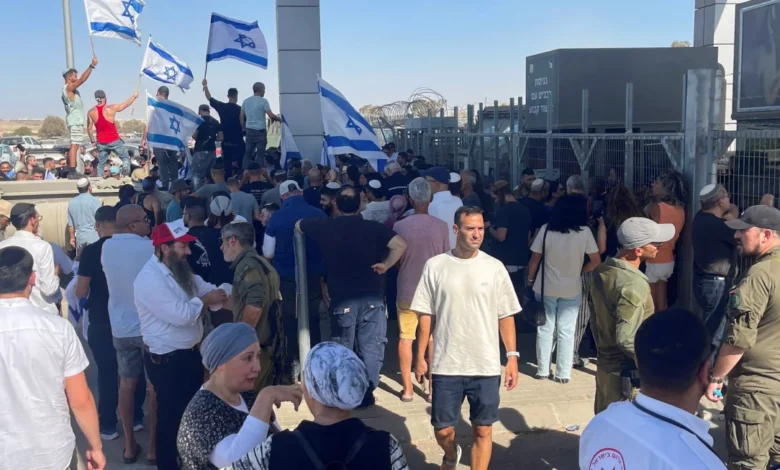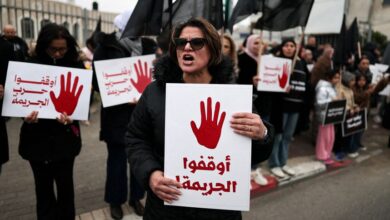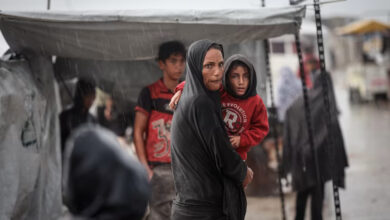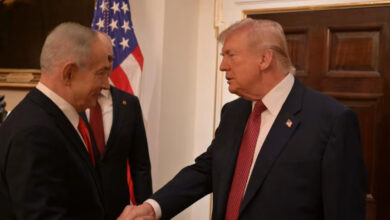
Footage posted to social media showed chaotic scenes at the Sde Teiman base in Israel’s Negev desert, where far-right Knesset member Zvi Sukkot was filmed slipping through a fence and entering the facility as crowds gathered outside, in protest against the probe. Another video showed people crowding the perimeter of the base as guards held them back.
Protesters also broke into an Israeli military base in central Israel’s Beit Lid, police said, where they clashed with security forces before being cleared out on Monday night. Several of the soldiers at the center of the abuse investigation were being questioned at the Beit Lid base.
The scenes were a stark illustration of the complex partisan divisions coursing though Israel at a time when its current government under Prime Minister Benjamin Netanyahu relies on support from far-right parties and as the military is already stretched by both the war against Hamas in Gaza and the growing threat posed by Hezbollah to the north.
An Israeli military official told CNN that Israel Defense Forces (IDF) leadership view the break-ins as severely harmful to the country’s security and pose a distraction as the military weighs its options in Lebanon, as fears of further escalation following Saturday’s deadly attack on Majdal Shams mount.
Defense Minister Yoav Gallant said on X the incident “plays into our enemies’ hands during war time.”
Netanyahu called for immediate calm at Sde Teiman and condemned the break-in at the base in a statement on Monday.
Crowds first gathered at Sde Teiman after the IDF said its Military Police Criminal Investigation Division (MPCID) was formally looking into the “suspected substantial abuse of a detainee” at the shadowy base, where prisoners from Gaza have allegedly been held under extreme conditions.
In a CNN investigation released in May, Israeli whistleblowers as well as Palestinian former detainees and eyewitnesses described widespread abuse at Sde Teiman, including blindfolding, extreme physical restraint and prolonged handcuffing leading to severe injuries.
Israeli leaders condemn break-ins
“The break-in at the Sde Teiman Base is extremely serious and against the law,” Lt. Gen. Herzi Halevi, the IDF’s Chief of the General Staff, said in a statement Monday, adding that the military was “working to restore order at the base.”
Opposition leader Yair Lapid also condemned the breach, criticizing the “dangerous criminality of (Knesset members) who weaken and dismantle the IDF, weaken and dismantle the state of Israel, gnawing away at the foundations of our power from within.”
The far-right Knesset member Sukkot, who was among those at Sde Teiman on Monday, is a member of the ultra-nationalist Religious Zionism party, which is led by the far-right finance minister Bezalel Smotrich.
Smotrich had previously voiced his support for the protests but called for the demonstrations to calm down after the Beit Lid break-in.
“I call on everyone to observe the law and the integrity of the military and the people, not to break into military bases and not to clash with our brothers, the soldiers and the police,” Smotrich said.
President Isaac Herzog slammed elected officials for their involvement, and for encouraging what he said was a “dangerous, illegal and irresponsible act.”
Clashes at Beit Lid
Videos posted to social media show protestors clashing with security forces while inside the base at Beit Lid.
Noam Goldberg, a correspondent with Israel’s Channel 13, was on the ground covering the protest and told CNN that protestors attacked her cameraman and shouted and cursed at her and her crew.
“The cameraman told me ‘I can’t! They’re breaking my camera! I’m being pushed!’ We tried to walk away, but the protesters blocked us, shouted and cursed. That’s when we felt under a feasible threat. They wouldn’t let me do my job,” Goldberg said.
Police initially were focused on protecting the base but eventually they were able to separate the Channel 13 crew from the protestors, she said.
Goldberg said the “extremely frightening” situation is part of a growing trend of hostility shown to Israeli journalists covering right-wing protests.
“I’ve covered similar right-wing pro-government protests in the past, I knew we might be assaulted, since Channel 13’s image is of a channel critical of the government. We made sure to hide any identifiable details,” Goldberg said.
The IDF’s Halevi visited the scene after the protestors were dispersed by police and military forces.
“We have come to Beit Lid because our soldiers are here and to ensure that nothing more severe happens. The arrival of rioters and attempts to break into bases are serious, unlawful behaviors bordering on anarchy, harming the IDF, the security of the state, and the war effort,” Halevi said.
Outcry over reports of abuse
Earlier this month, following an international outcry over reports of abuse at the Sde Teiman detention facility, Netanyahu told Israel’s Supreme Court that he had ordered an end to long-term imprisonment at the detention center, limiting its use to initial interrogations and a temporary holding facility. The vast majority of prisoners had already been transferred out of the desert facility, according to the Israeli government’s statement to the court at the time.
The Israeli military has previously acknowledged partially converting three different military facilities into detention camps for Palestinian detainees from Gaza since the Hamas-led October 7 attacks: Sde Teiman in the Negev desert, as well as Anatot and Ofer military bases in the occupied West Bank.
Last month, Halevi said the military had launched a probe into allegations of mistreatment at Sde Teiman, as well as at Anatot and Ofer.
As part of CNN’s investigation into Sde Teiman, three Israeli whistleblowers said that Palestinian detainees at the base were constantly blindfolded and held under extreme physical restraint. Doctors sometimes amputated prisoners’ limbs due to injuries sustained from continuous handcuffing, one whistleblower said. The account tallied with details of a letter authored by a doctor working at Sde Teiman published by Ha’aretz in April.
Several Israeli and Palestinian rights groups, as well as local and international media outlets, also detailed alleged torture and mistreatment at the camp.
Responding to CNN’s request for comment on all the allegations made in its May 10 investigation, the Israeli military said in a statement: “The IDF ensures proper conduct towards the detainees in custody. Any allegation of misconduct by IDF soldiers is examined and dealt with accordingly. In appropriate cases, MPCID investigations are opened when there is suspicion of misconduct justifying such action.”
“Detainees are handcuffed based on their risk level and health status. Incidents of unlawful handcuffing are not known to the authorities.”
The IDF did not directly deny accounts of people being stripped of their clothing or held in diapers. Instead, the Israeli military said that the detainees are given back their clothing once the IDF has determined that they pose no security risk.
CNN’s Abeer Salman in Jerusalem and Tamara Qiblawi in London contributed to this report.




